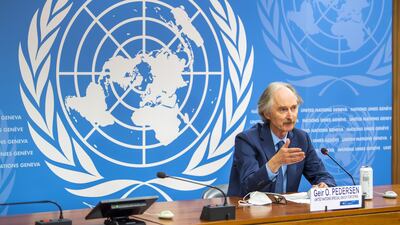The Arab League, European Union and a host of western and regional countries have reaffirmed support for a political solution to the conflict in Syria after a two-day meeting in Geneva that ended on Wednesday.
Representatives from the two blocs and Saudi Arabia, Qatar, Jordan, Iraq, Egypt, the US, the UK, Turkey, Norway and Germany attended the talks. Russia and Iran, Syrian President Bashar Al Assad's main allies in the conflict, did not take part.
A statement from the US State Department said: ‘’We reaffirmed our commitment to reaching a political solution to the Syrian crisis consistent with UN Security Council resolution 2254, including continued support for implementing and sustaining an immediate nationwide ceasefire, the Constitutional Committee, free and fair elections, the end of arbitrary detention and the release of all those unjustly held."
The countries repeated that there is no military solution to the Syrian crisis and reaffirmed their continued support of UN special envoy Geir Pedersen and his efforts to advance a political process.
“We called on all parties, in particular the government-nominated bloc, to resume meetings of the Syrian-led and Syrian-owned Constitutional Committee under UN auspices in Geneva and to advance an inclusive political solution that will protect the territorial integrity, unity and sovereignty of Syria and the rights and dignity of all Syrians,” the statement said.
The war, which started in 2011 after the government suppressed protests against the rule of Mr Al Assad, has killed hundreds of thousands of people and displaced nearly half of the pre-conflict population of 23 million, the UN estimates.
The government has regained control of Syria's biggest cities but parts of the north are still held by rebels and the Kurdish-led Syrian Democratic Forces (SDF).
The meeting's participants expressed concern about the continuing threat posed by ISIS militants and reaffirmed their commitment to the mission of the global coalition fighting the extremist group.
They emphasised the importance of continuing to provide humanitarian assistance across Syria by all means, including the expansion and extension of the UN's cross-border aid mechanism, saying there was no alternative that could match its scope and scale.
The UN Security Council passed a resolution in July to extend cross-border aid to Syria by six months. The Bab Al Hawa crossing from Turkey is the only route for humanitarian aid into the rebel-held north-west region of Syria that does not cross government-held territories.
The UN says more than four million people in the north-west are in dire need of assistance.
Russia previously vetoed several extensions to the aid mechanism as it wanted aid supplies to go through crossings under Syrian government control.
Many external powers, including Turkey, Russia, Iran and the US, have been involved in the Syrian conflict, further complicating the situation.
At least nine rounds of UN-mediated peace talks — known as the Geneva II process — have failed to make any progress towards a political solution.
Russia, Iran and Turkey set up parallel political talks known as the Astana process in 2017.













